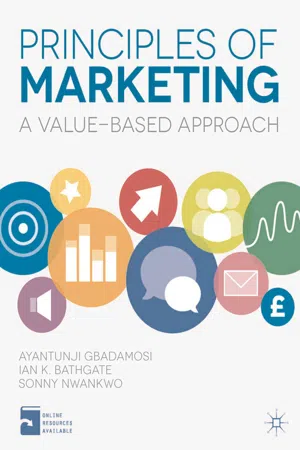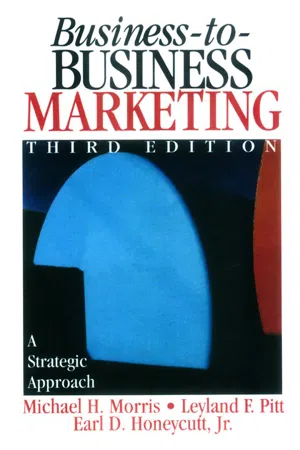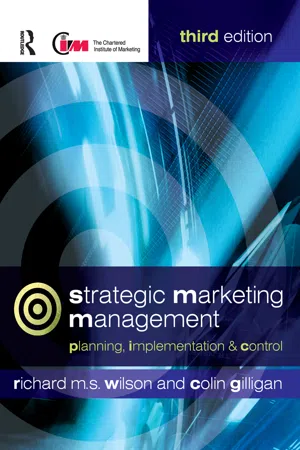Marketing
Concentrated Marketing
Concentrated marketing, also known as niche marketing, focuses on targeting a specific segment of the market with specialized products or services. This strategy involves tailoring marketing efforts to meet the unique needs and preferences of a particular group of consumers. By concentrating resources on a specific market segment, companies can often achieve higher levels of customer satisfaction and loyalty.
Written by Perlego with AI-assistance
Related key terms
1 of 5
10 Key excerpts on "Concentrated Marketing"
- eBook - PDF
Principles of Marketing
A Value-Based Approach
- Ayantunji Gbadamosi, Ian Bathgate, Sonny Nwankwo(Authors)
- 2013(Publication Date)
- Bloomsbury Academic(Publisher)
Compa-nies must therefore weigh their increase in sales against their increase in costs to ensure that using this strategy remains worthwhile and profitable. Concentrated Marketing strategy Also known as niche marketing, a Concentrated Marketing strategy means that the organization chooses to cater for and concentrate on one or in some cases a few of the market segments. The aim of this strategy is to specialize in serving the chosen segment more effec-tively and effi ciently than the competitors. Organizations that employ this strategy are those that have limited resources to fund their chosen strategy (for example, small businesses) or those that simply want to adopt a very exclusive marketing strategy (for example, Rolls-Royce cars or yacht manu-facturers, which tend to serve the high-income market segment exclusively). An advantage of Concentrated Marketing is that the company can acquire a repu-tation as a specialist in the market. Consequently, the company attains a strong market position because of its greater knowledge of customers’ needs within the niche it serves. Also, costs can be kept down as this strategy requires a single market-ing mix to be managed for the niche segment chosen. Many operating economies are enjoyed due to the company’s specialization in production, promotion and distribu-tion. If the segment is chosen well, Concentrated Marketing can be highly profitable with a high rate of return on investment. However, Concentrated Marketing does involve higher than normal risks because any change in the market can leave the company vulnerable if there is no fallback arrangement. Such changes could be the entry of capable or stronger competitors into the segment, or a significant change in the purchasing power or buying behav-iour of members of the segment. Many companies therefore choose to diversify into several market segments to avoid ‘putting all their eggs in one basket’. - eBook - PDF
Strategic Marketing Management in Asia
Case Studies and Lessons across Industries
- Syed Saad Andaleeb, Khalid Hasan(Authors)
- 2016(Publication Date)
- Emerald Group Publishing Limited(Publisher)
Success in a selected segment also depends on the extent of compe-tition in the segment. Thus, it is important to assess the target market in terms of Porter ’ s five forces to assess the via-bility of entering the segment and sustaining a firm ’ s marketing pro-grams in the segment. 5 Competition can be met strategically in a variety of ways. Concentrated Marketing or niche marketing is one way of deal-ing with competition. Here, instead of the competition defining the market and the offering, it remains the firm ’ s prerogative to define its target market. For example, today we see many 24/7 TV news channels in South Asian countries that emulate CNN ’ s approach to defining who, how, where, and when to serve its chosen segment with news and carve out a niche. In other words, instead of finding itself with a small share of the large market, these TV channels seek to grab a large share of the small but growing market they can dominate in future. Concentrated Marketing seeks to serve the interest of a single segment (fash-ion) of a broader market (readymade garments), looking for depth rather than breadth. Market Segmentation, Targeting, and Positioning 187 The alternative is to choose a multi-segment targeting strategy by choosing to go after two or more distinct markets (see Chapter 3). Honda ’ s decision to introduce a range of automobiles (the Odyssey, Accord, CRV, Civic, Fit, etc.) to serve the needs of different groups of customers is a case in point that enables it to attain wider market coverage and battle competition on their own turf. Such a strategy must of course be compatible with the firm ’ s overall ethos and objectives while being feasible from a financial and human resource perspective. - Brian Greenhalgh(Author)
- 2002(Publication Date)
- Routledge(Publisher)
In today’s rapidly changing environment products, services and markets have a limited life expectancy, as discussed by Peter Lansley in the introduction to this Part. A firm which does not update and change its services in the markets, is unlikely to be successful for long. A major job of management is therefore to determine which markets offer the business opportunities for profit and/or growth in the future. Market research is the tool used to generate the information for reaching such decisions. Three areas for research are particular important. First, the firm will want to estimate the size and growth potential of alternative markets since in general it will prefer to operate in growth, rather than mature or declining markets. Second, it will wish to judge the strength and competition in candidate markets. How tough is the competition? Will it be possible to carve out a niche without strong reaction from existing firms? Thirdly, choice of target markets will be influenced by the fit of the market requirements with the firm’s own strengths and weaknesses. A practice of quantity surveyors, for example, will probably wish to develop into markets which could use their skills in financial management and contract administration. In general, therefore, a company will seek opportunities in areas where it has some expertise, which will form the basis for a competitive edge.After a broad market is identified comes the key task of market segmentation. Undifferentiated marketing, i.e. a single marketing mix offered to the entire market, is rarely successful because markets are not homogeneous but made up of different types of buyers with diverse wants regarding benefits, price, channels of distribution and service. A market segment is a group of potential clients with similar purchasing characteristics. In developing a marketing plan, the firm usually has to design appropriate offers for each segment if they wish to compete. Differential marketing is the policy of attacking the market by tailoring separate services and marketing programmes for each segment. Concentrated Marketing is often the best strategy for the smaller firm. This entails selecting to compete in one segment and developing the most effective marketing mix for that sub-market. This could be particularly important in the construction professions, since the vast majority of firms and practices are small, with limited resources and rely on the skills and technical capabilities of specific people. A niche marketing strategy could therefore be particularly effective.11.4.2 Developing the marketing mix
The marketing mix is the set of choices which defines the firms offer to its target market. McCarthy has popularized the ‘four Ps’ definition of the marketing mix—Product, Price, Promotion and Place. Potential clients in the target segment have a set of wants and by research and successful adaptation the firm will develop an offer to match them.- eBook - PDF
- Alexander Hiam, Linda G. Rastelli(Authors)
- 2015(Publication Date)
- Wiley(Publisher)
Otherwise why would you go to all the trouble of designing a separate marketing program for each of them? 4.4.2 Concentrating on One Segment A concentration strategy targets only one segment of the market. For this strat- egy, you will only develop one marketing mix. Rolex, for instance, only concen- trates on the luxury segment of the watch market. Other companies go after the mass market. An organization that adopts a concentration strategy gains an advantage by being able to analyze the needs and wants of only one segment and then focusing all its efforts on that segment. This gives you a differential advantage over other companies that market to this segment but do not concentrate all their efforts on it. The drawback is that if demand in that particular segment declines, you have to readjust your marketing quickly or you will lose your customer base. You have, as the saying goes, all your eggs in one basket. 4.4.3 Adding a Segment to Expand Your Market If you are running out of customers and market and need to expand (see the “Growing with a Market-Expansion Strategy” in Section 2.1.1), one way to do it is to decide to target a new segment. Multisegment strategy is targeting a new, unreached segment of your market. For example, the consultant specializing in coaching executives in the health- care industry could decide to start offering a similar service to not-for-profits. See Figure 4-5. A different approach and marketing program will be needed, because the two industries are different in many ways and have only partial overlap (some hospitals are not-for-profits, but many not-for-profits are not hospitals). By specializing in two segments instead of just one, the consulting firm may be able to grow its total sales significantly. - eBook - PDF
- O. C. Ferrell, Michael Hartline, (Authors)
- 2018(Publication Date)
- Cengage Learning EMEA(Publisher)
• may be necessary when customer needs are similar within a single group but their needs differ across groups. • involves two options: the multisegment approach and the market concentration approach. Niche marketing: • involves focusing marketing efforts on one small, well-defined market segment or niche that has a unique, specific set of needs. • requires that firms understand and meet the needs of target customers so completely that, despite the small size of the niche, the firm’s substantial share makes the segment highly profitable. Individualized segmentation approaches: • have become viable due to advances in technology, particularly communication technology and the Internet. • are possible because organizations now have the ability to track customers with a high degree of specificity. Chapter 5 • Customers, Segmentation, and Target Marketing 149 Copyright 2017 Cengage Learning. All Rights Reserved. May not be copied, scanned, or duplicated, in whole or in part. Due to electronic rights, some third party content may be suppressed from the eBook and/or eChapter(s). Editorial review has deemed that any suppressed content does not materially affect the overall learning experience. Cengage Learning reserves the right to remove additional content at any time if subsequent rights restrictions require it. • allow firms to combine demographic data with past and current purchasing behavior so they can tweak their marketing programs in ways that allow them to precisely match customers’ needs, wants, and preferences. • will become even more important in the future because their focus on individual customers makes them critical to the development and maintenance of long- term relationships. • can be prohibitively expensive to deliver. • depend on two important considerations: automated delivery of the marketing program and personalization. - Available until 8 Feb |Learn more
- B van der Westhuyzen, J van der Merwe, B van der Westhuyzen, J van der Merwe(Authors)
- 2014(Publication Date)
- Future Managers(Publisher)
They choose to operate in a niche in the market with a limited product range. The company’s marketing activities are mainly directed at this segment.All their time and effort are concentrated on this segment . They become experts about the needs, motives and behaviour of their consumers and can develop a highly specialised marketing mix . There is however a disadvantage in using this marketing strategy. The drawback is that all the risks that are taken are concentrated in one segment (target market). The risk of product failure and non-acceptance of a product are all concentrated in one single target market. This is very dangerous for the company if consumer preferences should change in the target market, or if competitors should take over the market with a new product. 99 The Principles of Marketing Management N4 2.4.3 Differentiated market segmentation The company follows a differentiated market segmentation strategy when it serves two or more market segments at the same time. The company develops a separate marketing mix for each segment. This type of marketing segmentation strategy is also referred to as a multi-segmentation strategy . A multi-segmentation strategy offers many benefits to the company. Examples of these are higher income, a larger market share and scale benefits on production and marketing . A drawback of differentiated market segmentation is that it also generates higher costs . The following are examples of higher costs : • Product modification and product differentiation costs. A lot of research and development is necessary for product modification and product differentiation. New machinery is necessary to manufacture the newly modified product. - eBook - PDF
Business-to-Business Marketing
A Strategic Approach
- Michael H. Morris, Leyland F. Pitt, Earl Dwight Honeycutt, Jr.(Authors)
- 2001(Publication Date)
- SAGE Publications, Inc(Publisher)
Furthermore, new segments may be emerging, such as companies requiring mobile alarm systems. Degrees of Segmentation One of the distinctive characteristics of segmentation in industrial markets is the greater precision that is possible in a company's segmentation efforts. At one ex-treme, the marketer can approach the entire market as a whole and not use seg-mentation at all. This approach is equivalent to treating the entire market as one big segment and is called undifferentiated marketing. At the other extreme, every cus-tomer could be treated as a distinct segment, with specific programs tailored to its needs. When one, or relatively few, organizations are given sole attention, this ap-proach is termed Concentrated Marketing or one-to-one marketing. Between these two extremes, numerous options exist in terms of the size and scope of the mar-keter's segmentation efforts in various product-market areas. A number of seg-ments could be pursued with a number of marketing mixes. Figure 5 3 illustrates these possibilities. 130 I Business-to-Business Marketing Undifferentiated Marketing Concentrated or One-to-One Marketing The Entire Market Multiple Segments Every Customer Approached As One and Strategies Is a Segment Segment Figure 5.3. Strategic Options Possible Through Segmentation With undifferentiated marketing, the company seeks to compete on a broad basis, with all customers assumed to be reasonably similar. A fixed product line is devel-oped with standardized pricing, promotion, and distribution channels geared to what the company thinks are the needs of the typical customer or the vast majority in the market. With a Concentrated Marketing approach, the company channels its re-sources toward winning and building a relationship with a single company or seg-ment. The marketing effort would be intense and the stakes obviously high, as the firm becomes more dependent on individual accounts. - eBook - PDF
- Daniel Padgett, Andrew Loos(Authors)
- 2023(Publication Date)
- Wiley(Publisher)
A more narrowly focused example of segment marketing is niche marketing. In niche marketing, the company identifies a subsegment that has special needs that typically is not large enough for the larger competitors in a market to pursue. For example, title loan companies pursue high-credit-risk loan custom- ers that traditional banks would not pursue due to the risk. The title loan companies charge higher-than-normal interest rates to accept the additional risk. Segments should be internally consistent (homogeneous), but externally different (het- erogeneous). In other words, the customers within a segment have to be similar, but the seg- ments should be different from one another. For example, age might be a useful demographic micromarketing A marketing approach where a company considers every customer to be a segment of one. differentiated, or multisegment, marketing A marketing approach where the company identifies large groups that share similar characteristics. niche marketing A marketing approach where the company identifies a subsegment that has special needs that typically is not large enough for the larger competitors in a market to pursue. Technology Is Changing Segmentation Technology has had a significant impact on segmentation in recent years. The ability to track behavior and integrate data about cus- tomers has allowed marketers to use more segmentation variables and additional levels for more specific categorization. Compa- nies may literally provide their employees with pictures (real or stylized) with detailed descriptions of key customer types (see Figure 6.5). Electronics retailer Best Buy created customer types with names such as Buzz (young urban male tech enthusiast), Jill (busy suburban soccer mom who shops for the family), and Barry (high-income professional male who wants excellent service). Best Buy used the profiles to change store elements and to guide mar- keting tactics when training employees. - eBook - ePub
- Richard M.S. Wilson, Colin Gilligan(Authors)
- 2012(Publication Date)
- Routledge(Publisher)
The company’s strategy was changed, however, partly to cope with an increasingly aggressive competitive environment and partly to develop and capitalize on different patterns of consumer demand. As a result, the company’s marketing effort today now reflects buyers’ needs for a far wider variety of tastes and demands, which are packaged in a number of different sizes and types of container. It should be emphasized that the move on the part of many organizations in recent years towards product-differentiated or product-variety marketing has often had as its primary purpose the need to offer existing buyers greater variety, rather than to appeal to new and different market segments. In many ways, therefore, product-variety marketing can be seen as an interim step in the move towards target marketing, in which the strategist identifies the major market segments, targets one or more of these segments, and then develops marketing programmes tailored to the specific demands of each segment. For some organizations target marketing leads to a concentration of effort on a single target market with a single marketing mix. Referred to as concentrated segmentation, it is a strategy that has been pursued with great success by the piano makers Steinway. The company defines its market as the concert and professional pianist and, while others may buy the product, they are not part of the strategic target market. The obvious advantage of an approach such as this is that, having identified a particular market, the firm can then control costs by advertising and distributing only to the market segment it views as its primary target. In so far as disadvantages exist with a strategy of concentration, they stem from the possibility of missed opportunities; it may be the case, for example, that significant opportunities exist elsewhere but that the firm’s single-minded approach to just one part of the market fails to recognize this - eBook - PDF
Mastering the Rules of Competitive Strategy
A Resource Guide for Managers
- Norton Paley(Author)
- 2007(Publication Date)
- Auerbach Publications(Publisher)
3. Introduce a product (or product modification) not already developed by exist-ing competitors that can fortify your position and reinforce your concentra-tion strategy. 4. Secure your primary segment by private labeling your product concurrent with establishing your own brand. You thereby create a barrier by blocking a competitor’s entry. 5. Expand into additional market segments with new product offerings. Also consider modifying existing products, providing value-added services, build-ing in specialized applications, or developing creative packaging. 6. Recognize that every market segment you enter is actually the starting point of a new operation and a new sales cycle, which opens up a whole set of fresh possibilities. 7. No campaign is complete without first determining where to concentrate your efforts. The aim is to apply maximum effort at a decisive point. That point means positioning your resources to satisfy market demands, while preempt-ing your competitor from taking similar action with any chance of success. Finally, when you are developing a concentration strategy, you should address cer-tain questions: 1. Should you change the allocation of your resources after you have gained a favor-able market position? If you have gained a dominant position, as in the Apple iPod case with 85 percent market share, then you should move partially from the offensive to the defensive, making certain that you have an active d efense.* You sa w the effect of a somewhat lethargic response by Xerox’s man-agement when Japanese copier companies first showed interest in the North American market and then moved energetically to concentrate in the small-business segment as its initial point of entry. Consequently, how you deploy your resources and, in particular, how you shape your marketing mix should change with the situation. This also means adding as much flexibility to your organization as feasible, which includes holding reserves.
Index pages curate the most relevant extracts from our library of academic textbooks. They’ve been created using an in-house natural language model (NLM), each adding context and meaning to key research topics.









